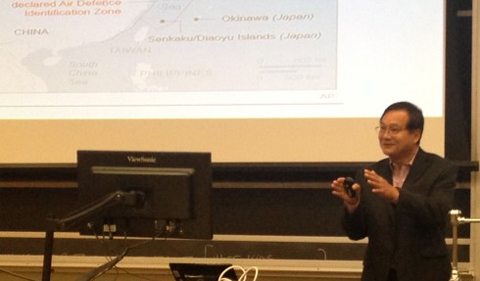By Nikki Rodriguez
Two Arts & Sciences professors kicked off the War and Peace theme this fall with a discussion on “Brief Thoughts About China” in September.
Students “all need to understand what is going on in the world, especially in those so called flash-point regions … so you can be a part of making peace in the world. But if you don’t understand it, you don’t know how to play a positive role in world peace,” said Dr. Jieli Li, Professor of Sociology, who focused on the East and South China Sea conflict in the Asia-Pacific region.
Dr. Joshua Hill, Assistant Professor of History, gave a brief overview on Chinese history and current-day relevance through the lens of economy, population, and news.
China and Global Security
“This [talk] is about China and global security,” Li said. “Why? Because this is very timely. The President of China, Xi Jinping just visited the United States. President Obama met with him, and they talked about these global and regional security issues. Now the United States is the largest economy in the world, China is the second largest economy in the world, so there’s a lot of mutual interest and concerns in their talking.”
Li spoke about the East and South China Seas—an area rich in hydrocarbons such as natural gas and oil, and an important global trade route—and the claims that China, Japan, The Philippines, Vietnam, and Malaysia are all trying to lay on the area, with no true authority to decide whose claims are legitimate. The United States as a Pacific country holds a stake in the matter as well because the U.S. has been serving as a critical balance-of-power force in the region since after the second world war. Li explained that the U.S. faces the decision to either ally with nations disputing with China, or to make room for a rising China.
Li’s talk addressed the historical roots of maritime disputes in the region and analyzed the motives and consequences of China’s recent land-reclaiming move on a chain of Islands in the South China Sea and China’s unilateral declaration of Air Defense Identification Zone in the East China Sea.
“The tensions seem to be on the verge of eruption. If diplomacy is not handled well among the involved nations, this region is very likely to have a war…. It’s not like a remote reality. It can occur at any moment,” he said.
‘Know the Key Flash Points in the Region’
After the initial presentation, the floor opened for a Q&A with the students, who got the opportunity to talk to experts about their speculations, concerns, and suggestions. Students asked questions ranging from where other nations stood to what the best possible outcome of this conflict could be. Some questions could be answered easily, but others only opened up speculation.
“For the War and Peace theme, we look at the regions where the events going on might trigger a war, and we [ask ourselves], ‘how should we stop the war?’” said Li. “For the ROTC students, it is very useful to know the key flash points in the region…. They are going to serve the U.S. military, so they should understand their duties and how to become peacemakers.”
Alexandra Vasel, a junior double majoring in Russian and European studies with a minor in military science, sees the merit in these discussions.
“ROTC has a partnership with the War and Peace theme, and it’s tailored to what we want to know, from cadets to officers,” she said. She also spoke about the need to know what is going on in the world in order to help predict where the army could one day end up.
For more information on the South and East China Sea conflict in the Asia-Pacific region, email Li at lij@ohio.edu.




















Comments